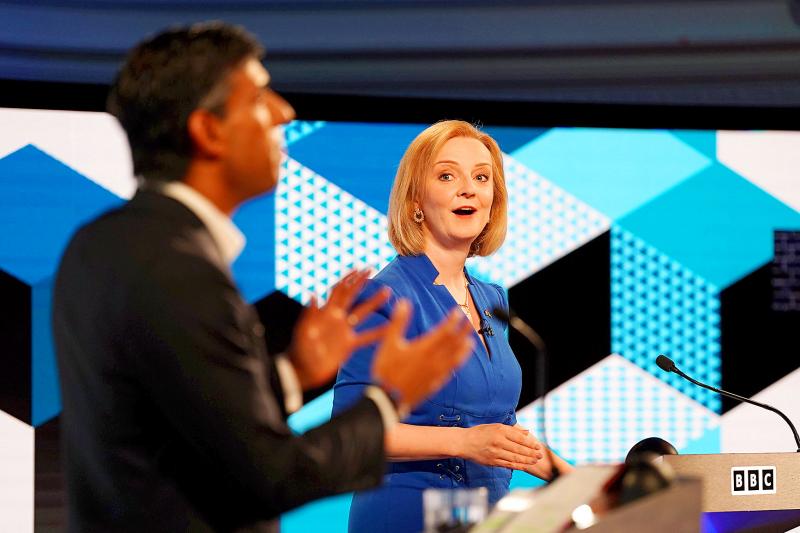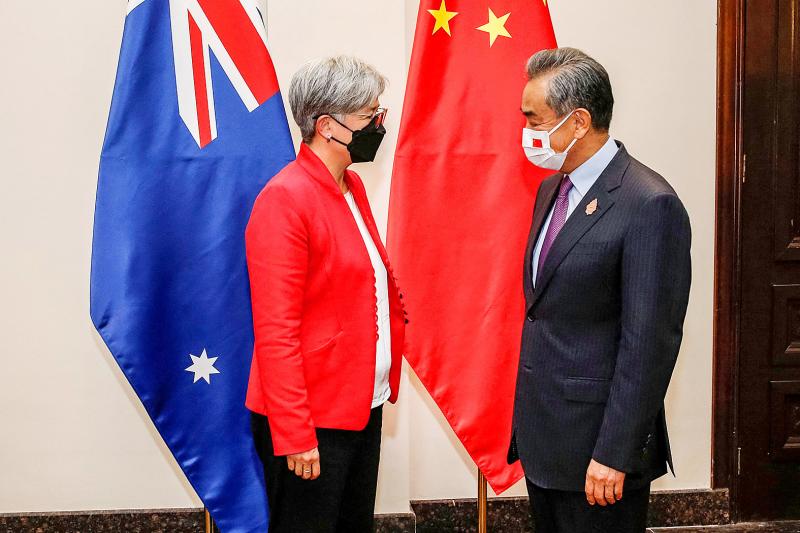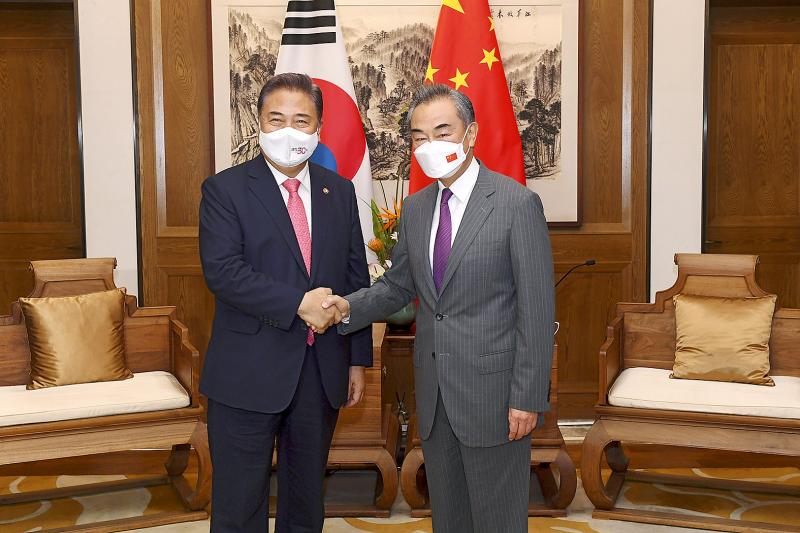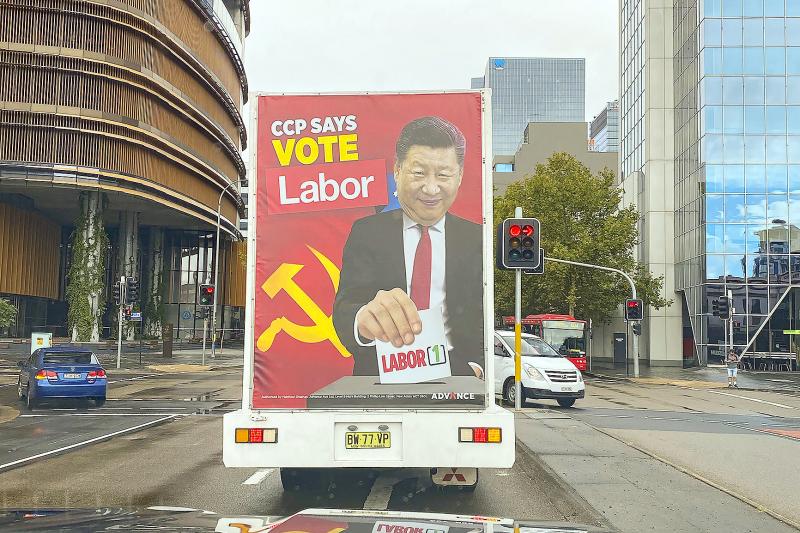It’s not just the economy. While inflation and recession fears weigh heavily on the minds of voters, another issue is popping up in political campaigns from the UK and Australia to the US and beyond: the “China threat.”
The two finalists vying to become Britain’s next prime minister, Liz Truss and Rishi Sunak, clashed in a televised debate last month over who would be toughest on China.
It’s a stark departure from outgoing Prime Minister Boris Johnson’s business-focused “Sinophile” approach and part of a hardening of anti-China rhetoric in many Western countries and other democracies, like Japan, that is coming out in election campaigns.

Photo: AP
Nations for years have sought to balance promoting trade and investment with the world’s second-largest economy with concerns about China’s projection of military power, espionage and its human rights record.
The pendulum is swinging toward the latter, as evidenced in US, European, Japanese and Australian opposition to the threatening Chinese military drills that followed US House Speaker Nancy Pelosi’s visit to Taiwan last week, and growing warnings from Western intelligence agencies about Beijing’s snooping and interference.
A delegation of US lawmakers arrived Sunday in Taiwan to discuss reducing tensions in the Taiwan Strait and investments in semiconductors, among other topics.

Photo: AFP
That shift has made China a target for vote-seeking politicians as opinion polls show public sentiment in many democracies turning against China. Some candidates blame China for economic woes at home in addition to posing a security threat to its neighbors and the wider world.
DRAMATIC SHIFT
China loomed large in Australia’s election in May in which the conservatives, who ultimately lost, tried to paint the opposition as being unwilling to stand up to Beijing.

Photo: AP
America’s growing rival on the global stage is also expected to figure in this fall’s US congressional races, particularly in Midwest industrial states, long after former President Donald Trump embraced a fierce anti-China posture.
Many in Europe are also rebalancing their approach to China, though that did not figure significantly in elections in France this year and in Germany last year.
Andreas Fulda, a University of Nottingham political scientist specializing in China, said British politicians “are more clear-eyed about China” than their European neighbors.

Photo: AP
“The UK has paid close attention to what’s happening in Australia, and in many ways the debate here is well ahead of mainland Europe,” he said.
Truss, the British foreign secretary and the front-runner in the Conservative Party’s leadership race, has spoken of expanding what she calls a “network of liberty” so democracies can counter China and Russia more effectively. She says she will crack down on Chinese tech companies such as the owner of TikTok, the short-video platform.
In her role as Britain’s top diplomat, Truss has strongly criticized China’s military moves after Pelosi’s Taiwan visit, accusing Beijing of an “aggressive and wide-ranging escalation” that “threaten(s) peace and stability in the region.”
Sunak, Britain’s former Treasury chief, has pledged to shutter the partially Chinese-funded Confucius Institutes that promote Chinese culture and language at UK universities, lead an international alliance against Chinese cyberthreats, and help British companies and universities counter Chinese spying.
“I had a sense of deja vu having just moved over from Australia,” said Ben Bland, director of the Asia-Pacific program at London’s Chatham House think tank, who previously worked at the Lowy Institute in Sydney. “There’s a similar atmosphere with some politicians trying to deploy the China threat as a domestic political tool.”
Bland described a dramatic shift in how politicians talk about China in both the UK and Australia, from a focus on trade and business ties five years ago to viewing China “through the prism of a threat to national security and economic competitiveness.”
NEGATIVE VIEWS
In the Australian election, conservatives broke from a bipartisanship tradition on critical national security issues to accuse the center-left Labor Party of being likely to appease Beijing.
The gambit came up short. Labor, whose victory ended nine years of conservative rule, denied it would shift its China policy and has called China’s military drills around Taiwan “disproportionate and destabilizing.”
“This is not something that solely Australia is calling for,” Australian Foreign Minister Penny Wong said, adding the entire region was concerned.
A Lowy Institute survey released in June found Australians increasingly concerned about their nation’s largest trading partner. Three-quarters of respondents said it was at least somewhat likely China would become a military threat to Australia in the next 20 years, up 30 percentage points since 2018.
A Pew Research Center poll the same month found negative views of China are at or near historic highs in many of the 19 countries surveyed in North America, Europe and Asia.
Relations between London and Beijing have soured since President Xi Jinping (習近平) was granted a 2015 state visit the UK government hoped would cement deals to give Britain a vast pool of investment and China greater access to European markets.
Johnson, who took power in 2019, always stressed that he was not a “knee-jerk Sinophobe” — but under pressure from the US, his government excluded Chinese firms from the UK’s 5G communications network. Britain also has welcomed thousands of people from Hong Kong as Beijing squeezes the freedoms in the former British colony.
The head of the MI6 intelligence agency, Richard Moore, said last month that China had overtaken terrorism as its top priority, as British spies try to understand the threats Beijing’s growing assertiveness might pose.
“That feels like a very big moment, post-9/11,” Moore said.
The US also is shifting intelligence resources to China.
NO CLEAR STRATEGY
Yet China experts say much of the rhetoric from Western politicians is just political grandstanding.
Steve Tsang (曾銳生), director of the China Institute at the London University School of Oriental and African Studies, said neither candidate seeking to be Britain’s next prime minister has articulated a coherent policy on China. The winner is to be announced Sept. 5 after a Conservative Party vote.
“The indications are that (Sunak’s) words on China policy are not based on any kind of a strategy,” Tsang said. “Nor has Truss articulated a proper China strategy, despite being the current foreign secretary.”
China has pushed back against the growing hostility. “I would like to make it clear to certain British politicians that making irresponsible remarks about China, including hyping the so-called ‘China threat,’ cannot solve one’s own problems,” Foreign Ministry spokesperson Zhao Lijian (趙立堅) said after the Sunak-Truss debate.
In the US, both major political parties have railed against China on the campaign trail, particularly in the Midwest, where Chinese imports are blamed for a loss of manufacturing jobs.
Pennsylvania Republican Senate nominee Mehmet Oz ran thousands of TV ads this spring that mentioned China. In Ohio, Democratic Senate contender Tim Ryan declared in one ad: “It’s us vs China.”
Polling suggests neither China, nor foreign policy in general, is a top-of-mind issue for most US voters. But political strategists believe China is likely to remain a potent political issue in the November US congressional election, as candidates seek to link China to America’s economic challenges.
In Asia, it has been more nuanced.
Japanese voters have become more supportive of a stronger military following the Russian invasion of Ukraine and the heightening tensions over Taiwan.
In the presidential vote in South Korea in March, the candidates differed on how to manage the intensifying rivalry between two important partners, China and the US.
South Korean President Yoon Suk Yeol, who narrowly won, vowed to build a stronger alliance with the US, while his liberal opponent argued for a balancing act. But since taking office in May, Yoon has avoided upsetting China, an important export market.
He did not meet Pelosi when she came to South Korea from Taiwan, though he spoke to her by phone, and his government has refrained from criticizing the Chinese military moves around the self-governing island.

Taiwan Power Co (Taipower, 台電) and the New Taipei City Government in May last year agreed to allow the activation of a spent fuel storage facility for the Jinshan Nuclear Power Plant in Shihmen District (石門). The deal ended eleven years of legal wrangling. According to the Taipower announcement, the city government engaged in repeated delays, failing to approve water and soil conservation plans. Taipower said at the time that plans for another dry storage facility for the Guosheng Nuclear Power Plant in New Taipei City’s Wanli District (萬里) remained stuck in legal limbo. Later that year an agreement was reached

What does the Taiwan People’s Party (TPP) in the Huang Kuo-chang (黃國昌) era stand for? What sets it apart from their allies, the Chinese Nationalist Party (KMT)? With some shifts in tone and emphasis, the KMT’s stances have not changed significantly since the late 2000s and the era of former president Ma Ying-jeou (馬英九). The Democratic Progressive Party’s (DPP) current platform formed in the mid-2010s under the guidance of Tsai Ing-wen (蔡英文), and current President William Lai (賴清德) campaigned on continuity. Though their ideological stances may be a bit stale, they have the advantage of being broadly understood by the voters.

In a high-rise office building in Taipei’s government district, the primary agency for maintaining links to Thailand’s 108 Yunnan villages — which are home to a population of around 200,000 descendants of the Chinese Nationalist Party (KMT) armies stranded in Thailand following the Chinese Civil War — is the Overseas Community Affairs Council (OCAC). Established in China in 1926, the OCAC was born of a mandate to support Chinese education, culture and economic development in far flung Chinese diaspora communities, which, especially in southeast Asia, had underwritten the military insurgencies against the Qing Dynasty that led to the founding of

It’s fairly well established that strength training is helpful at every age: as well as building muscle, it strengthens tendons and ligaments, increases bone density and seems to have protective effects against everything from osteoporosis to dementia. But a new study based on data collected over two decades in Rio de Janeiro, Brazil, suggests that another physical attribute might be just as important — and it’s one that declines even faster than strength as the years go by. The good news? It might also be less uncomfortable, and even slightly safer, to improve. Also, it will probably make you better